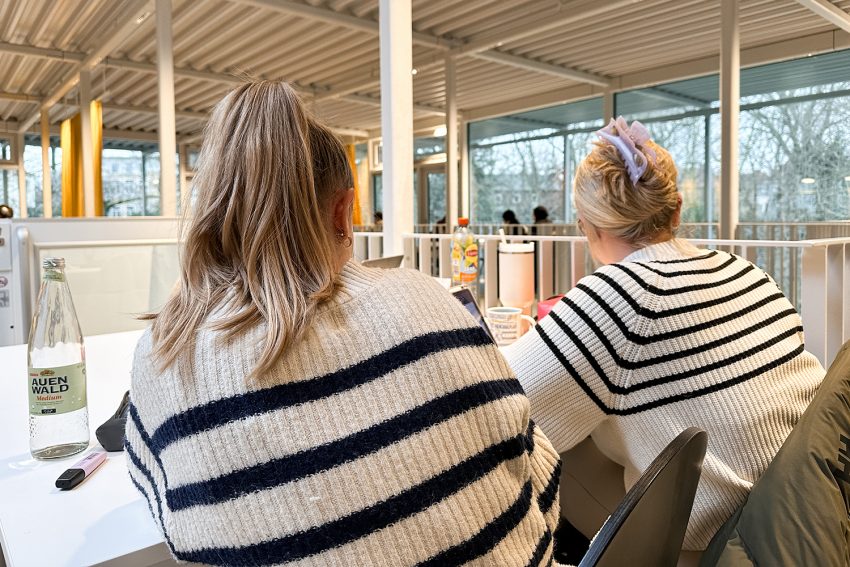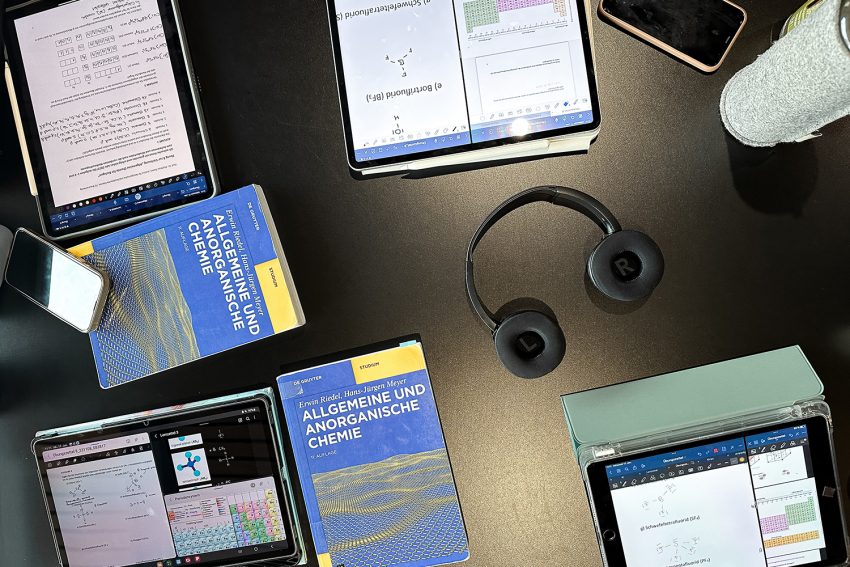This is how students rock their exam phase! Tips from students for students
How can I best prepare for the exam? Tips to study better! Memorise in three days! – Questions and phrases that many students have probably already researched. But what really helps? With the exam period just around the corner and students already busy preparing for their exams, we asked students on campus for their tips on how to make the exam period as stress-free as possible.

Exams are on the agenda and students can be seen preparing for their upcoming exams, especially in the Student House and the University Library. Photo credit: Dilara Aktaş/TU Braunschweig
Repeat! Repeat! Repeat!
The students agree that repetition is essential. Julia explains that she prepares the lectures, takes notes and tries to understand the course content. If something is difficult to understand, she gets more information and does some research on the Internet. She writes down facts that she needs to remember on index cards.
When Mervi makes her study notes, she makes sure she understands the topics and doesn’t just write them down. “In the Abitur I just wrote down everything we had to learn. Now that I’m studying, I’m already actively learning and trying to understand things when I write my study notes”.
Chiara has a different approach. She prepares the material completely before she starts studying. During the winter holidays, for example, she went through all the lecture slides for her Chemistry course. Once she has an overview, she notes down all the necessary information so that she can write it all down herself. “Because I learn pretty well just by writing.” She then minimises the facts and summarises everything more compactly on her tablet before writing her study notes.
Exercises and old exams
Another popular way of studying is by doing exercises and old exams, which all the students we spoke to use to prepare for exams. “In most subjects we have exercises where we are given practice sheets, so I just repeat them,” says Judith. She also makes intensive use of the old exams on offer to prepare for exams.
Appeal to other senses
Anika likes to change her place of study when she is having trouble concentrating at her desk and goes for a walk, for example. To do this, she reads the content out loud at home and records herself doing so. She then listens to her audio version through headphones as she walks – just like a podcast. “I find it very practical because I can perceive the content through other senses and I am forced to listen.”
The Student House as a favourite place to study
When students are asked where they prefer to study, the Student House is at the top of the list. This is where students like to prepare their study material, for example, by summarising lectures and making study notes or index cards. Hadi says he particularly appreciates the “teaching atmosphere” in the Student House. “Everyone learns together, everyone learns something different, but everyone learns. That’s a very pleasant atmosphere for me.” This is more difficult for him at home, where he is often distracted by other tasks.
But when it comes to memorising, many people prefer to study at their own desk at home.
Creating a balance to learning
As well as learning, it is important to take breaks. “When I feel it’s getting really tiring and I’m not making any progress, I take a break,” says Mervi. She rewards herself with something tasty to eat. Anika has her own reward system. She sets herself small work packages and rewards herself at the end with sport, free time or something sweet.
Julia balances her learning with exercise. After a day at her desk, she likes to exercise, go jogging or take a walk outside. Lena and Judith also make sure they get enough sleep and eat and drink enough.
Other tips that came up again and again were to plan enough free time during the exam period and not to neglect socialising. “The most important thing and what helps me is not only studying, but also the free time between studying. That’s what I learnt in the Abitur, otherwise I wouldn’t have had time to think about all the course content,” says Chiara. After a hard day of studying, Mervi likes to spend the evening with friends, where she can relax.
The biggest distractions

Smartphones and digital devices are among the biggest distractions to learning. Photo credit: Dilara Aktaş/TU Braunschweig
“Definitely the mobile phone and other electronic devices. And social media, of course. You always want to be up to date,” says Hadi about the biggest distractions when studying.
This is confirmed by other students. It often happens that they are researching something for an upcoming exam and then quickly read the messages again or just have a quick look at the social media channels.
But there are other distractions. Julia says she is often distracted at home by household chores, and Hadi feels the same way. “I end up doing things that I want to do, but don’t necessarily need to be done right now. Then I feel the urge to get it done,” he says.
Another distraction can be fellow students. Christian and Dominik report. “It is nice to study together, but we distract each other from time to time.“
We wish all students success in their upcoming exams and a stress-free exam period!
